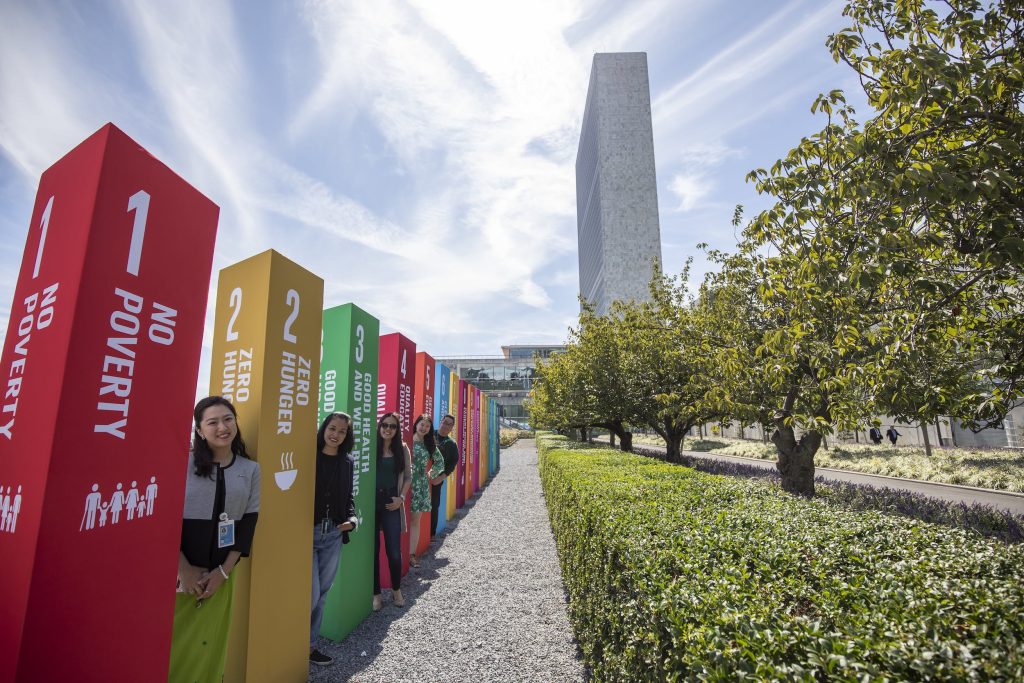At the summit, UN member states adopted a political declaration (diplomatic speak for a shared statement of their intentions.) These documents help set common norms among countries and enable citizens to hold their leaders accountable for their promises.
The political declaration, entitled, “Gearing up for a decade of action and delivery for sustainable development,” proclaimed:
“We stand firm in our determination to implement the 2030 Agenda as a plan of action for people, planet, prosperity, peace, and partnership – a plan to free humanity from the tyranny of poverty and heal and secure our planet for future generations.”
The summit featured more than 100 registered SDG “acceleration actions.” For example, Mexico pledged to expand access to energy; the Netherlands committed to providing more people with access to justice; and the United Kingdom committed £515 million toward education. A group of Pacific Island nations launched the “Pacific Blue Shipping Partnership” to decarbonize shipping in the region by 2050.
In addition to governments, other sectors also stepped up SDG action.
- Cities: More than 20 cities around the world joined a declaration to advance the SDGs and to commit to tracking their progress through “Voluntary Local Reviews.” U.S. cities including Pittsburgh and New York talked about how they are moving forward on the SDGs in the United States. And local and regional governments emphasized the need to localize the SDGs and pledged “to leave no one, no place, and no territory behind.”
- Companies: Many businesses continue to publicly embrace the SDGs. At the UN General Assembly, the UN Global Compact announced that 87 major companies have committed to aligning their work with limiting global temperature rise to 1.5 degree Celsius. Additionally, at the Climate Action Summit, some of the world’s largest asset owners launched the “Net-Zero Asset Owner Alliance” and committed to achieving carbon-neutral investment portfolios by 2050.
- Universities: A group of universities around the world pledged through the “University Global Compact” to work together to share knowledge and spur innovation on the SDGs – a powerful example of actors within a sector working as collaborators instead of competitors. Additionally, Carnegie Mellon University announced that it will undertake a “Voluntary University Review” to assess its contributions toward the SDGs.
- Civil Society and Multilateral Institutions: Civil society groups and international institutions launched a number of new efforts to accelerate progress, such as the Global Partnership for Sustainable Development Data’s “Data for Now” initiative to improve the use of timely data for the SDGs. The Organisation for Economic Cooperation and Development and the UN Development Programme launched the “Global Hub for the Governance of the SDGs” to support countries in implementing the SDGs.
A word on financing
Following the conclusion of the SDG Summit, the UN hosted a high-level dialogue on financing for development, with the Secretary-General noting that “financing is the test of our seriousness. Without resources, we will simply not deliver for people or planet.
The dialogue covered a number of challenges standing in the way of financing for development: rising debt burdens among many nations, especially Small Island states; insufficient development aid; entrenched inequality; and an economic system that promotes short-term gains over long-term needs. The UN noted that the financing gap to achieve the SDGs in developing countries is estimated to be US$ 2.5 – 3 trillion per year.
Hopefully, this dialogue will serve as a reminder to the world that we won’t achieve the SDGs with only good intentions; we need the resources to back up our actions.

